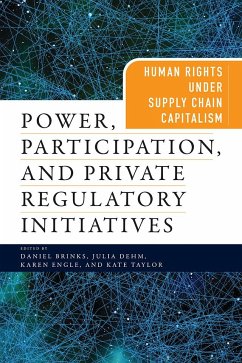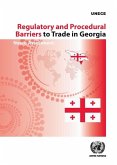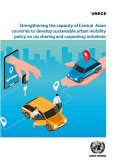Power, Participation, and Private Regulatory Initiatives
Human Rights Under Supply Chain Capitalism
Herausgeber: Brinks, Daniel; Taylor, Kate; Engle, Karen; Dehm, Julia
Power, Participation, and Private Regulatory Initiatives
Human Rights Under Supply Chain Capitalism
Herausgeber: Brinks, Daniel; Taylor, Kate; Engle, Karen; Dehm, Julia
- Broschiertes Buch
- Merkliste
- Auf die Merkliste
- Bewerten Bewerten
- Teilen
- Produkt teilen
- Produkterinnerung
- Produkterinnerung
This volume brings together academics and practitioners from around the world to engage in theoretical analysis, case study exploration, and reflection on a variety of private regulatory initiatives (PRIs) that may certify that actors along the global supply chain conform to certain codes of conduct.
Andere Kunden interessierten sich auch für
![Private Power, Public Law Private Power, Public Law]() Susan SellPrivate Power, Public Law30,99 €
Susan SellPrivate Power, Public Law30,99 €![Human Rights and Private Wrongs Human Rights and Private Wrongs]() Alison BryskHuman Rights and Private Wrongs71,99 €
Alison BryskHuman Rights and Private Wrongs71,99 €![Revised Recommendations on Regulatory Cooperation and Standardization Policies Revised Recommendations on Regulatory Cooperation and Standardization Policies]() Revised Recommendations on Regulatory Cooperation and Standardization Policies18,99 €
Revised Recommendations on Regulatory Cooperation and Standardization Policies18,99 €![Regulatory Takings Regulatory Takings]() Regulatory Takings19,99 €
Regulatory Takings19,99 €![Regulatory and Procedural Barriers to Trade in Georgia Regulatory and Procedural Barriers to Trade in Georgia]() Regulatory and Procedural Barriers to Trade in Georgia52,99 €
Regulatory and Procedural Barriers to Trade in Georgia52,99 €![Strengthening the Capacity of Central Asian Countries to Develop Sustainable Urban Mobility Policy on Car Sharing and Carpooling Initiatives Strengthening the Capacity of Central Asian Countries to Develop Sustainable Urban Mobility Policy on Car Sharing and Carpooling Initiatives]() Strengthening the Capacity of Central Asian Countries to Develop Sustainable Urban Mobility Policy on Car Sharing and Carpooling Initiatives35,99 €
Strengthening the Capacity of Central Asian Countries to Develop Sustainable Urban Mobility Policy on Car Sharing and Carpooling Initiatives35,99 €![Credit Union Regulatory Improvements - Scholar's Choice Edition Credit Union Regulatory Improvements - Scholar's Choice Edition]() Credit Union Regulatory Improvements - Scholar's Choice Edition25,99 €
Credit Union Regulatory Improvements - Scholar's Choice Edition25,99 €-
-
-
This volume brings together academics and practitioners from around the world to engage in theoretical analysis, case study exploration, and reflection on a variety of private regulatory initiatives (PRIs) that may certify that actors along the global supply chain conform to certain codes of conduct.
Hinweis: Dieser Artikel kann nur an eine deutsche Lieferadresse ausgeliefert werden.
Hinweis: Dieser Artikel kann nur an eine deutsche Lieferadresse ausgeliefert werden.
Produktdetails
- Produktdetails
- Verlag: University of Pennsylvania Press
- Seitenzahl: 368
- Erscheinungstermin: 30. Juli 2021
- Englisch
- Abmessung: 226mm x 152mm x 24mm
- Gewicht: 476g
- ISBN-13: 9780812253313
- ISBN-10: 0812253310
- Artikelnr.: 61118026
- Herstellerkennzeichnung
- Libri GmbH
- Europaallee 1
- 36244 Bad Hersfeld
- gpsr@libri.de
- Verlag: University of Pennsylvania Press
- Seitenzahl: 368
- Erscheinungstermin: 30. Juli 2021
- Englisch
- Abmessung: 226mm x 152mm x 24mm
- Gewicht: 476g
- ISBN-13: 9780812253313
- ISBN-10: 0812253310
- Artikelnr.: 61118026
- Herstellerkennzeichnung
- Libri GmbH
- Europaallee 1
- 36244 Bad Hersfeld
- gpsr@libri.de
Edited by Daniel Brinks, Julia Dehm, Karen Engle, and Kate Taylor
Acknowledgments
Key Acronyms
Part I. Framing the Discussion: Private Regulatory Initiatives, Human
Rights, and Supply Chain Capitalism
Chapter 1. Private Regulatory Initiatives, Human Rights, and Supply Chain
Capitalism
Daniel Brinks, Julia Dehm, Karen Engle, and Kate Taylor
Chapter 2. Closing Gaps in the Chain: Regulating Respect for Human Rights
in Global Supply Chains and the Role of Multi-stakeholder Initiatives
Justine Nolan
Part II. Multi-stakeholder Initiatives and the Maldistribution of Power
Chapter 3. The Kimberley Process Certification Scheme and the Continuation
of "Conflict Diamonds"
Farai Maguwu
Chapter 4. Reforming Commodity Certification Systems to Respect Indigenous
Peoples' Rights: Prospects for the Forestry Stewardship Council and
Roundtable on Sustainable Palm Oil
Marcus Colchester
Chapter 5. What Difference Can Certification Regimes Make? The Mapuche
People's Claims for Autonomy and the Forestry Industry in Southern Chile
Charles R. Hale and José Aylwin
Chapter 6. Sustainability Certification and Controversies Surrounding Palm
Oil Expansion in Guatemala
Geisselle Vanessa Sánchez Monge
Part III. Worker-Driven Social Responsibility Programs: Attempts to
Redistribute Power
Chapter 7. Assessing Feasibility for Worker-Driven Social Responsibility
Programs
Sean Sellers
Chapter 8. From Public Relations to Enforceable Agreements: The Bangladesh
Accord as a Model for Supply Chain Accountability
Jessica Champagne
Chapter 9. Transformation Through Transparency: Human Rights and Corporate
Responsibilities in the Global Food System
Erika George
Part IV. Critical Reflections
Chapter 10. Reflections on Labor Standards in Global Supply Chains:
Innovation and Scalability
James J. Brudney
Chapter 11. Situating Human Rights Approaches to Corporate Accountability
in the Political Economy of Supply Chain Capitalism
Dan Danielsen
Chapter 12. Taking Consumers Seriously: Public Regulatory Tools of
Accountability
Lauren Fielder
Chapter 13. Private Regulatory Initiatives and Beyond: Lessons and
Reflections
Daniel Brinks, Julia Dehm, Karen Engle, and Kate Taylor
Notes
List of Contributors
Index
Key Acronyms
Part I. Framing the Discussion: Private Regulatory Initiatives, Human
Rights, and Supply Chain Capitalism
Chapter 1. Private Regulatory Initiatives, Human Rights, and Supply Chain
Capitalism
Daniel Brinks, Julia Dehm, Karen Engle, and Kate Taylor
Chapter 2. Closing Gaps in the Chain: Regulating Respect for Human Rights
in Global Supply Chains and the Role of Multi-stakeholder Initiatives
Justine Nolan
Part II. Multi-stakeholder Initiatives and the Maldistribution of Power
Chapter 3. The Kimberley Process Certification Scheme and the Continuation
of "Conflict Diamonds"
Farai Maguwu
Chapter 4. Reforming Commodity Certification Systems to Respect Indigenous
Peoples' Rights: Prospects for the Forestry Stewardship Council and
Roundtable on Sustainable Palm Oil
Marcus Colchester
Chapter 5. What Difference Can Certification Regimes Make? The Mapuche
People's Claims for Autonomy and the Forestry Industry in Southern Chile
Charles R. Hale and José Aylwin
Chapter 6. Sustainability Certification and Controversies Surrounding Palm
Oil Expansion in Guatemala
Geisselle Vanessa Sánchez Monge
Part III. Worker-Driven Social Responsibility Programs: Attempts to
Redistribute Power
Chapter 7. Assessing Feasibility for Worker-Driven Social Responsibility
Programs
Sean Sellers
Chapter 8. From Public Relations to Enforceable Agreements: The Bangladesh
Accord as a Model for Supply Chain Accountability
Jessica Champagne
Chapter 9. Transformation Through Transparency: Human Rights and Corporate
Responsibilities in the Global Food System
Erika George
Part IV. Critical Reflections
Chapter 10. Reflections on Labor Standards in Global Supply Chains:
Innovation and Scalability
James J. Brudney
Chapter 11. Situating Human Rights Approaches to Corporate Accountability
in the Political Economy of Supply Chain Capitalism
Dan Danielsen
Chapter 12. Taking Consumers Seriously: Public Regulatory Tools of
Accountability
Lauren Fielder
Chapter 13. Private Regulatory Initiatives and Beyond: Lessons and
Reflections
Daniel Brinks, Julia Dehm, Karen Engle, and Kate Taylor
Notes
List of Contributors
Index
Acknowledgments
Key Acronyms
Part I. Framing the Discussion: Private Regulatory Initiatives, Human
Rights, and Supply Chain Capitalism
Chapter 1. Private Regulatory Initiatives, Human Rights, and Supply Chain
Capitalism
Daniel Brinks, Julia Dehm, Karen Engle, and Kate Taylor
Chapter 2. Closing Gaps in the Chain: Regulating Respect for Human Rights
in Global Supply Chains and the Role of Multi-stakeholder Initiatives
Justine Nolan
Part II. Multi-stakeholder Initiatives and the Maldistribution of Power
Chapter 3. The Kimberley Process Certification Scheme and the Continuation
of "Conflict Diamonds"
Farai Maguwu
Chapter 4. Reforming Commodity Certification Systems to Respect Indigenous
Peoples' Rights: Prospects for the Forestry Stewardship Council and
Roundtable on Sustainable Palm Oil
Marcus Colchester
Chapter 5. What Difference Can Certification Regimes Make? The Mapuche
People's Claims for Autonomy and the Forestry Industry in Southern Chile
Charles R. Hale and José Aylwin
Chapter 6. Sustainability Certification and Controversies Surrounding Palm
Oil Expansion in Guatemala
Geisselle Vanessa Sánchez Monge
Part III. Worker-Driven Social Responsibility Programs: Attempts to
Redistribute Power
Chapter 7. Assessing Feasibility for Worker-Driven Social Responsibility
Programs
Sean Sellers
Chapter 8. From Public Relations to Enforceable Agreements: The Bangladesh
Accord as a Model for Supply Chain Accountability
Jessica Champagne
Chapter 9. Transformation Through Transparency: Human Rights and Corporate
Responsibilities in the Global Food System
Erika George
Part IV. Critical Reflections
Chapter 10. Reflections on Labor Standards in Global Supply Chains:
Innovation and Scalability
James J. Brudney
Chapter 11. Situating Human Rights Approaches to Corporate Accountability
in the Political Economy of Supply Chain Capitalism
Dan Danielsen
Chapter 12. Taking Consumers Seriously: Public Regulatory Tools of
Accountability
Lauren Fielder
Chapter 13. Private Regulatory Initiatives and Beyond: Lessons and
Reflections
Daniel Brinks, Julia Dehm, Karen Engle, and Kate Taylor
Notes
List of Contributors
Index
Key Acronyms
Part I. Framing the Discussion: Private Regulatory Initiatives, Human
Rights, and Supply Chain Capitalism
Chapter 1. Private Regulatory Initiatives, Human Rights, and Supply Chain
Capitalism
Daniel Brinks, Julia Dehm, Karen Engle, and Kate Taylor
Chapter 2. Closing Gaps in the Chain: Regulating Respect for Human Rights
in Global Supply Chains and the Role of Multi-stakeholder Initiatives
Justine Nolan
Part II. Multi-stakeholder Initiatives and the Maldistribution of Power
Chapter 3. The Kimberley Process Certification Scheme and the Continuation
of "Conflict Diamonds"
Farai Maguwu
Chapter 4. Reforming Commodity Certification Systems to Respect Indigenous
Peoples' Rights: Prospects for the Forestry Stewardship Council and
Roundtable on Sustainable Palm Oil
Marcus Colchester
Chapter 5. What Difference Can Certification Regimes Make? The Mapuche
People's Claims for Autonomy and the Forestry Industry in Southern Chile
Charles R. Hale and José Aylwin
Chapter 6. Sustainability Certification and Controversies Surrounding Palm
Oil Expansion in Guatemala
Geisselle Vanessa Sánchez Monge
Part III. Worker-Driven Social Responsibility Programs: Attempts to
Redistribute Power
Chapter 7. Assessing Feasibility for Worker-Driven Social Responsibility
Programs
Sean Sellers
Chapter 8. From Public Relations to Enforceable Agreements: The Bangladesh
Accord as a Model for Supply Chain Accountability
Jessica Champagne
Chapter 9. Transformation Through Transparency: Human Rights and Corporate
Responsibilities in the Global Food System
Erika George
Part IV. Critical Reflections
Chapter 10. Reflections on Labor Standards in Global Supply Chains:
Innovation and Scalability
James J. Brudney
Chapter 11. Situating Human Rights Approaches to Corporate Accountability
in the Political Economy of Supply Chain Capitalism
Dan Danielsen
Chapter 12. Taking Consumers Seriously: Public Regulatory Tools of
Accountability
Lauren Fielder
Chapter 13. Private Regulatory Initiatives and Beyond: Lessons and
Reflections
Daniel Brinks, Julia Dehm, Karen Engle, and Kate Taylor
Notes
List of Contributors
Index








